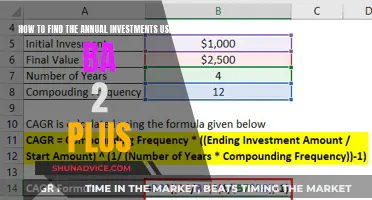
Unsettled cash is the cash you receive from the sale of an investment. This cash cannot be withdrawn until it has gone through a settlement process. The settlement period is the time between the trade date and the settlement date. The settlement date is when the payment is made and the transfer of security ownership occurs. The settlement period allows time for buyers and sellers to physically exchange their respective halves of the trade. During the settlement period, the funds are considered unsettled.
What You'll Learn
- Unsettled funds are any funds in your account that are still being processed
- Unsettled funds can be proceeds from the sale of an investment
- You can use unsettled funds to make another purchase in a cash account
- Settlement periods were created to allow time for buyers and sellers to physically exchange their respective halves of the trade
- Settled funds are available for withdrawal

Unsettled funds are any funds in your account that are still being processed
The settlement period is the time between the trade date and the settlement date. In the past, the settlement period was much longer, but as of May 2024, stocks have a one-business-day (T+1) settlement period. This means that proceeds generated by selling stock in a cash account are considered unsettled for one business day following the trade date.
During the settlement period, you may be able to use the unsettled funds to make another purchase in a cash account, as long as the proceeds do not result from a day trade. However, you typically cannot withdraw unsettled funds until they are fully processed and settled.
It is important to note that if you purchase a security in a cash account with unsettled funds, you must hold that security until you pay for it in full with a new deposit or until the settlement date of the trade that generated the funds for the purchase. Selling a security purchased with unsettled funds before the settlement date can result in a good-faith violation.
Where Should Your Cash Go: Mortgage or Investment?
You may want to see also

Unsettled funds can be proceeds from the sale of an investment
Unsettled funds refer to the proceeds generated by selling a security, which are considered unsettled until the settlement period is complete. This period, which is usually one business day (T+1) for stocks, is the time between the trade date and the settlement date. During this time, the buyer must pay for the trade in full, and the seller must deliver the security.
For example, if you sell a security on Monday, the trade is settled on Tuesday, and you can use the proceeds to purchase another security immediately. However, if you sell the new security before the settlement date of the original sale, it will result in a good-faith violation. This occurs when you buy a security with unsettled funds and then sell it before the proceeds from the original sale have settled.
To avoid a good-faith violation, you must wait until the proceeds from the original sale have settled before selling the newly purchased security. This is because, during the settlement period, you agree in good faith to hold the new security until the funds from the original sale are settled.
It is important to understand the concept of unsettled funds and the rules surrounding their use to avoid potential settlement violations when trading in a cash account.
How Cash App Investing Works for Beginners
You may want to see also

You can use unsettled funds to make another purchase in a cash account
Unsettled funds refer to the proceeds from selling a security, which are considered unsettled until the settlement period is complete. The settlement period refers to the time between the trade date and the settlement date—the date when the payment is made and ownership of the security is transferred. As of May 28, 2024, stocks have a one-business-day settlement period (T+1), so proceeds from selling stock are considered unsettled funds for one business day following the trade date.
Unsettled funds can be used to make another purchase in a cash account, as long as the proceeds do not result from a day trade. This is because the cash you can use to buy securities, or your "cash buying power", combines both settled and unsettled cash. However, if you use unsettled funds to purchase a security, you must hold that security until you can pay for it in full, either with new deposits or when the funds from the original sale settle. Selling the security before the original sale settles is considered a "good faith violation" and will result in penalties.
A good faith violation occurs when you sell a security before paying for the initial purchase in full with settled funds. For example, if you sold XYZ stock on Monday morning and used the proceeds to buy ABC stock on Monday afternoon, you would commit a good faith violation if you sold the ABC stock before Tuesday (the settlement date of the XYZ sale). This is because the proceeds from the sale of XYZ stock were not yet settled and therefore could not be used to pay for the purchase of ABC stock.
To avoid good faith violations, it is important to understand the rules of trading in a cash account. Cash accounts require that all purchases be paid in full on or before the settlement date. Settled funds, unsettled funds available, and unsettled funds unavailable are all used to determine a cash account's buying power. While unsettled funds can be used to make purchases, they cannot be withdrawn until they are fully processed and settled.
Mortgages: Cash or Investment? Understanding the Basics
You may want to see also

Settlement periods were created to allow time for buyers and sellers to physically exchange their respective halves of the trade
Unsettled cash refers to the funds you receive from selling an investment. These funds cannot be withdrawn until they have been settled, which typically takes a few days. The settlement period is the time between the trade date and the settlement date, when the trade is finalised and considered complete.
Settlement periods were initially created to allow time for buyers and sellers to physically exchange their respective halves of the trade. Before the advent of online trading platforms, owning a stock meant possessing a physical stock certificate, and completing a trade could take several days. The Securities and Exchange Commission (SEC) established settlement periods to facilitate the physical exchange of money and stock certificates between buyers and sellers.
The SEC was directed to create a national clearance and settlement system for securities transactions by Section 17A of the Securities Exchange Act of 1934. Over time, the settlement period has been shortened due to technological advancements. In 1993, the SEC reduced the settlement period from five to three business days (T+3). Further reductions were made in 2017 to two days (T+2), and in 2023, the SEC approved a one-day settlement cycle (T+1) which came into effect in May 2024.
Today, the settlement period serves as a rule and a convenience for traders, brokers, and investors, even though money transfers are now instantaneous. It provides time for buyers to ensure they have sufficient funds in their accounts and for sellers to deliver the securities being traded. While the physical exchange of certificates and cash is no longer necessary, the settlement period remains an important component of securities trading, creating the concept of unsettled funds.
Understanding Cash Equivalent Investments: Basic Features Explained
You may want to see also

Settled funds are available for withdrawal
Settlement Periods:
The Securities and Exchange Commission (SEC) established settlement periods to allow time for buyers and sellers to physically exchange their respective halves of a trade. While technology has advanced, and it no longer takes days to transfer money, settlement periods remain a factor in securities trading. The settlement period typically lasts one business day (T+1) for stocks, ETFs, and options trades. Mutual funds can take between one and three business days, depending on the fund.
Unsettled Funds:
Unsettled funds refer to any funds in your account that are still being processed. These could be from a deposit, a sell order, or free slices of stock. During the settlement period, these funds are considered unsettled and cannot be withdrawn until the process is complete.
Settled Funds:
After the settlement period ends, the proceeds from the sale become settled funds, and you can withdraw them. Additionally, cash deposited or wired into your brokerage account for trading is also considered settled. It's important to note that, while you can use unsettled funds to make purchases in a cash account, you typically cannot withdraw them until they are fully settled.
Good Faith Violations:
Using unsettled funds for purchases can lead to a Good Faith Violation (GFV) if you sell securities bought with those unsettled proceeds before they are fully paid for. This can result in a 90-day restriction on your account.
Collection and Settlement:
It's important to distinguish between collection and settlement. The collection period refers to the time it takes for a deposit to clear and be fully received by the firm, typically lasting 2-6 business days for deposits made through EFT or check. During this time, the funds will appear as credited to your account, and you can trade up to a certain threshold, but you cannot withdraw or transfer them until they are fully collected. Direct deposits and bank wires, on the other hand, are typically collected upon receipt.
Unlocking Investment Strategies: Determining Cash Availability
You may want to see also
Frequently asked questions
Unsettled funds are any funds in your account that are still being processed. These could be from a deposit, a sell order, or free slices of stock.
Unsettled cash is cash that is still being processed and cannot be withdrawn. Settled cash is money that has been processed and can be used to trade and withdrawn.
The settlement period is the time between the trade date and the settlement date. For stocks, this is usually one business day (T+1), but it can vary depending on the type of security.
Yes, you can use unsettled cash to make another purchase in a cash account, as long as the proceeds do not result from a day trade. However, you must hold that investment until the funds from the original sale settle.







